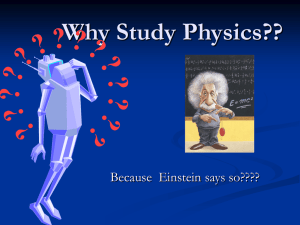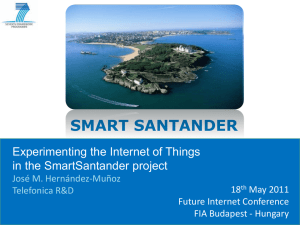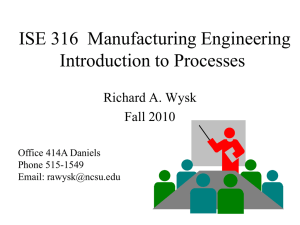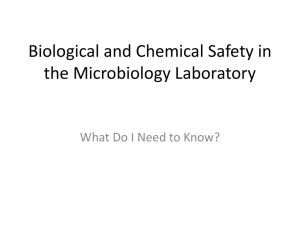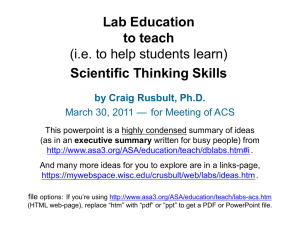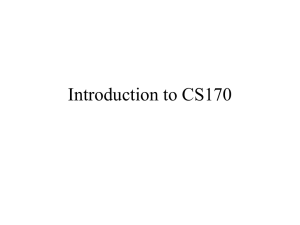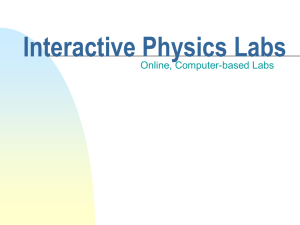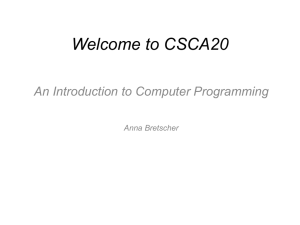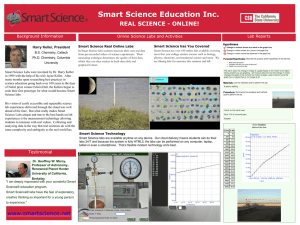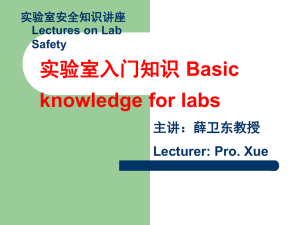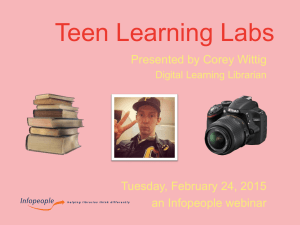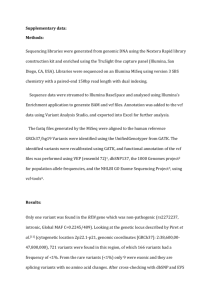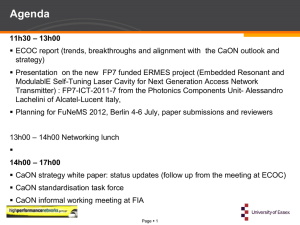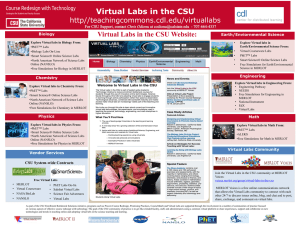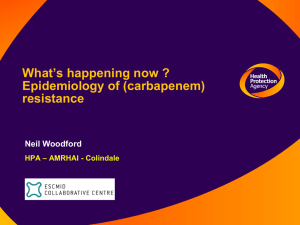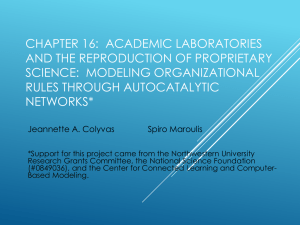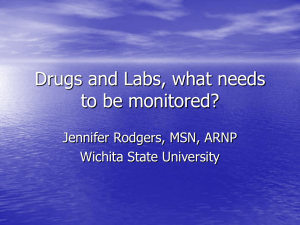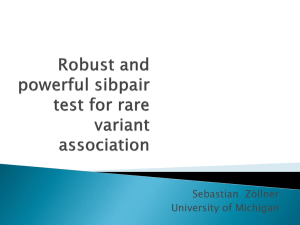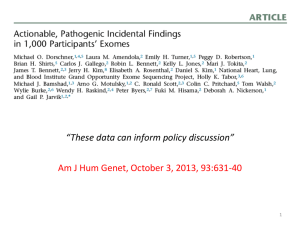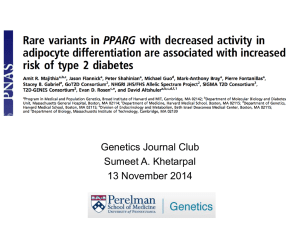Yvonne Wallis - UKNEQAS for Molecular Genetics
advertisement
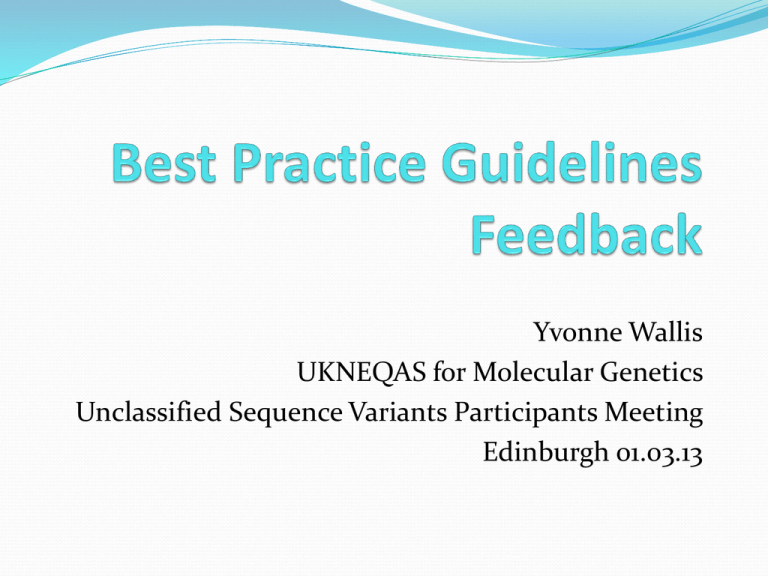
Yvonne Wallis UKNEQAS for Molecular Genetics Unclassified Sequence Variants Participants Meeting Edinburgh 01.03.13 UV Best Practice Meeting April 2007 NOWGEN CMGS/Dutch labs/Special guests Jennie Bell/Simon Ramsden Draft Updated Guidelines February 2013 Interpretation & Reporting of Rare & Novel Variants 1st Best Practice Guidelines January 2008 Interpretation & Reporting of UVs Follow up Best Practice Meeting UKNEQAS UV Participants Workshop March 2013 Final Updated Guidelines March 2013 Interpretation & Reporting of Rare & Novel Variants March 2011 Birmingham CMGS labs Pathogenicity of sequence variants interpretation Pilot EQA scheme 2012 Follow up best practise meeting March 2011 2008 guidelines in place for 3 years Very good base-useful and were used/referenced Embedded within our discipline Facilitated a more standardised approach within labs to variant assessment Time to review them Still accurate? New information? Reflect actual practice? Was there consistency across labs? Do labs apply/use common strategies/rules? Uncertainty about the use of in silico tools How to use them Trust them/apply them Meeting aim-review each section in turn to expand and consolidate where necessary Revision process: to produce 2013 DRAFT version MEETING-2011 Each section reviewed/discussed Changes agreed Individuals nominated to make changes as appropriate Kathryn Robertson coordinated revision process POST MEETING Dutch lab members reviewed Further reiterations Lots of changes Final draft Feb 2013 (YW-used judgement and common sense!) Please flag errors Today or yvonne.wallis@bwhct.nhs.uk 2013 DRAFT guidelines-what next? Number of outstanding issues Overlap with outcomes from UKNEQAS UV pilot scheme 2012 TODAY Coming together Reach consensus Recommendations incorporated in to the final version OVER LUNCH: New Title: Reporting and Interpretation of Rare or Novel Sequence Variants Terminology: Use of “Variant of uncertain significance” Use of VUS (VOUS suggested by Dutch reviewers) What’s new and requires further discussion in v2? 4.2 Presence or absence on SNP Databases Section promoted and extended Additional information Useful/accurate/problems? What rules do labs use to assign benign polymorphism? 4.5 Co-segregation with the disease in the family Inclusion of SISA Simplified method for segregation analysis Background information or potentially useful? Criteria for it’s implementation? What’s new and requires further discussion in v2? 4.7 Species conservation Significantly expanded Lots of new references Does it need more? Nucleotide conservation? Use of PhyloP and PhastCons tools? How much weight do labs put on this? Do labs create gene specific MSAs? 4.8 In silico prediction of pathogenic effect Significant modification New references Is this sufficient to support labs? How much weight do labs put on this? Do labs validate tools using variants with known effect? What’s new and requires further discussion in v2? 4.9 In silico splice site prediction Significantly expanded Additional references included Alamut mentioned within this section Note of caution Is this enough? Should instructions be included on how to use the software? Is information on scores of the prediction tools needed? Should there be suggested criteria for changes in scores supporting consistent follow up studies? E.g., 10% deviation from the wild-type score What’s new and requires further discussion in v2? 5.4 Classification of variants Number of outstanding issues related 4 vs 5 class system Dutch reviewers recommend 4 categories UK team prefer 5 categories Overlap with NEQAS scheme outcomes Should/could a common preferred system be implemented Common definitions Common wording Common recommendations for follow up studies Final Thoughts Lots of amendments Lots of helpful information IMPORTANT to close off outstanding issues Never going to be perfect-evolving TODAY-NOT a full BP meeting Consensus from guidelines and NEQAS outcomes 1st BPs to be ratified by ACGS Acknowledgements Participants attended the follow up BP meeting 2011 Kathryn Robertson Andrew Devereau Stewart Payne Ciaron McAnulty Dutch lab colleagues
